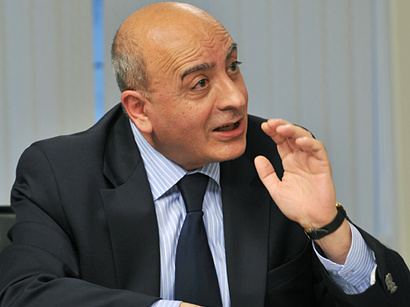Analyst cites importance of inter-community dialogue on Karabakh conflict

By Sabina Idayatova
An Azerbaijani political analyst says it is important to establish dialogue between the Azerbaijani and Armenian communities of Nagorno-Karabakh -- a region occupied by Armenia since a war in the early 1990s.
"However, the Armenian side evades any direct contact between the communities, considering that the status of Nagorno-Karabakh should be determined in direct talks with Azerbaijan and the Azerbaijani government," Rasim Musabayov told AzerNews. "The Armenians are unwilling to take into account the Azerbaijani community's position in this regard."
Azerbaijan and Armenia have been locked in conflict for over two decades, which emerged over Armenian territorial claims against its South Caucasus neighbor. Since the brutal war, Armenian armed forces have occupied 20 percent of Azerbaijan's territory, including Nagorno-Karabakh and seven surrounding regions. A fragile ceasefire has been in place since 1994, but long-standing efforts by US, Russian and French mediators have been largely fruitless so far. Armenia has not yet implemented the U.N. Security Council's four resolutions on its pullout from the neighboring country's territories.
Musabayov pointed out that the number of the people living in the Nagorno-Karabakh region makes up only 1 percent of Azerbaijan's entire population and this 1 percent is willing to hold talks with the Azerbaijani government.
"They don't want to discuss the issue at the negotiating table," he says.
According to Musabayov, in any case, the Azerbaijani side insists on arranging dialogue between the communities.
"If we are dealing with mutual dialogue and reconciliation, the parties should first discuss the issue at the table in an effort to find a common ground further to be reviewed by the Azerbaijani government," the analyst concluded.
However, there is a strict governmental regime in Armenia and launching the communities' dialogue will depend only on the Armenian authorities, in particular, the Armenian president's order, he said.
But unfortunately, Musabayov predicted, the Armenian authorities will avoid any negotiations until the presidential elections to be held in February 2013.
EU Special Representative for the South Caucasus Philippe Lefort during his visit to Azerbaijan at the end of November said the present conflict between two South Caucasus neighbors is a very important issue for the EU, which recognizes the territorial integrity of Azerbaijan and other countries. Lefort also noted the importance of dialogue between the communities to accelerate resolution of the conflict.
Chairman of the Azerbaijani community of Nagorno-Karabakh Bayram Safarov said earlier this week that Armenia is hampering Azerbaijani and Armenian communities' dialogue over the Nagorno-Karabakh conflict.
Safarov said that the Azerbaijani community invites the Armenian community to discussions, adding that such meetings should be held regularly.
"...The communities, ordinary people, intellectuals and cultural figures should meet and communicate with each other, understand each other; peace, tranquility and cohabitation should be restored," Safarov said.
"Azerbaijan is doing everything for a peaceful settlement of the conflict, and of course, in this respect a lot depends on Armenia, in particular, the upcoming presidential elections to be held in this country," he said.
Meanwhile, a member of the Azerbaijani Community of Nagorno-Karabakh Public Union, Rovshan Rzayev, also said that the Azerbaijani community is interested in establishing dialogue with the Armenian community of Nagorno-Karabakh.
"Extensive work should be done to that end," Rzayev told local media this week. "The main issue in the negotiations should be establishment of trust between the communities. We have made such an attempt in Germany, but the Armenians did not join the meeting. The main reason is the reluctance of the Armenian leadership to reckon with our compatriots who lived in Nagorno-Karabakh."
According to Rzayev, the stereotypes of "ethnic discrepancy" claimed by the Armenian leadership have been dismissed.
"Public support is very important in this regard. Today`s internationally known Nagorno-Karabakh conflict is the aggression against the Azerbaijani territorial integrity."
